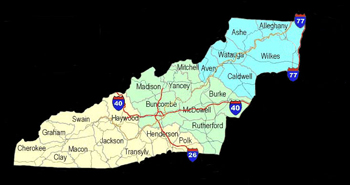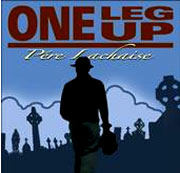Source:
Mountain Area Information Network / Buncombe
Buncombe County has
changed in form since its inception, but it was always within
the folds of the Appalachian mountains, judged to be the oldest
in the world. Named after a Revolutionary War figure, Colonel
Edward Buncombe, the county was formed from parts of Burke
and Rutherford counties in 1791.
Buncombe County was
initially much larger than it is today. It once incorporated
all of Rutherford County west of the mountains and most of
the western part of Burke County while, to the south, it reached
to the South Carolina border and then ran westward all the
way to the Tennessee line. It has gone through at least ten
distinct permutations from its creation until present day.
Today it consists of 646 square miles lying on the western
slopes of the eastern continental divide. It is bounded on
the north by Madison and Yancey counties, on the east by McDowell
and Rutherford, on the west by Madison again and Haywood,
and finally on the south by Henderson county. It is roughly
bisected by the French Broad river which has the distinction
of being the third oldest river in the world as well as one
of the few rivers to flow from south to north.
At the county's
center lies Asheville, the county seat, named after Samuel
Ashe, governor of North Carolina from 1796-1798. Originally
Asheville was named Morrisville and known in Thomas Wolfe's
novel Look Homeward Angel as Altamont.
Although the Cherokee
have lived in this area for a long time, longer than any of
the European immigrants, they say that they were not the first
ones here. They tell strange tales of tiny white men with
'almond shaped eyes' living in this area long ago. These tales
seem to be buttressed by the word the Native American Crow
as well as early adventurers such as trappers and members
of military survey expeditions through this area. Other accounts
tell of accidently discovered graveyards consisting entirely
of tiny graves.
Mysteries and legends abound in the early
history of this area. Tales of Spanish miners who were slaughtered
on the banks of a river due west of the county and their laboriously
lode of silver dumped into the depths of the river and the
opening to the mine hidden again forever. They had been drawn
to the area by tales of gold and gems to find silver.
In their
feverish efforts to extract the mineral they neglected to
provide for themselves, electing instead to rob the nearby
tribe of Cherokee. The tribe were at first patient but the
increasing boldness of the small party of Spaniards ultimately
had to be dealt with in swift, bold methods.Geologically, the area
is rich in a variety of minerals and other natural resources
as a result in its early era of considerable volcanic activity.
| WNC Outdoors | WNC Waterfalls |



















































